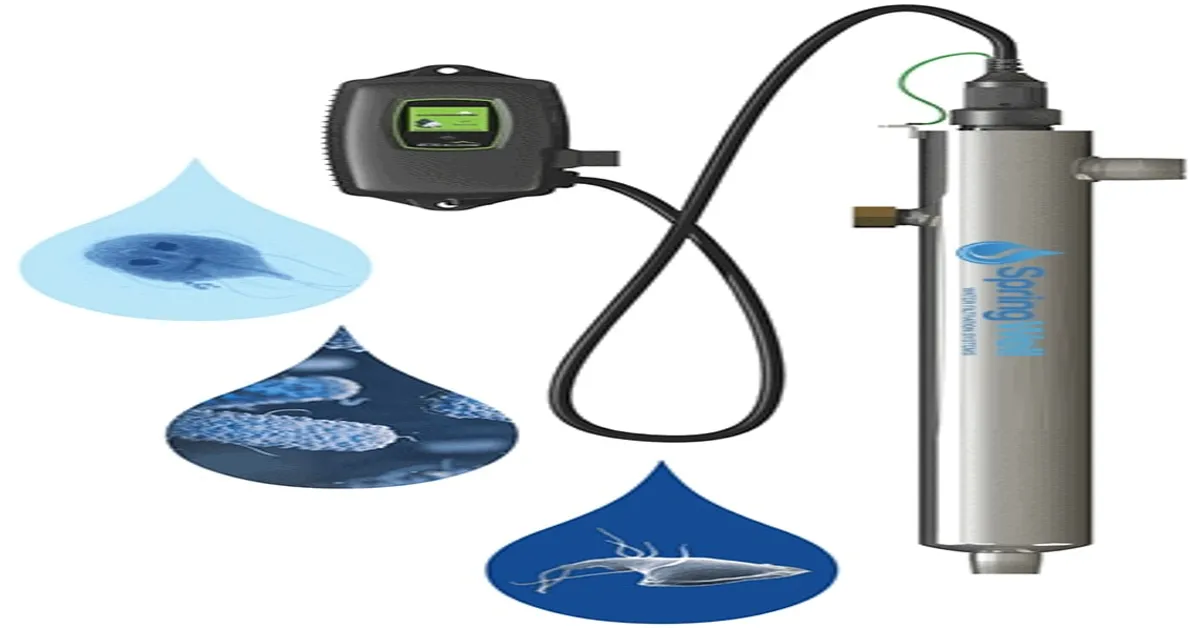Diving headfirst into the world of water filtration, we’ve all been there, standing in the aisle of a store, bewildered by the myriad of options. Choosing a water filter can be an overwhelming task, especially when it comes to understanding the jargon. But, among the plethora of choices, the UV water filter is a term that continues to crop up.
A proven solution that assures you of safe, clean, and healthy drinking water, it’s gaining momentum in households worldwide. So, is a UV water filter necessary? Let’s delve into the details and unearth the truth about this innovative technology.
Introduction to UV Water Filters
Is a UV water filter necessary? This question has become more prevalent in recent times, as people are becoming increasingly aware of the importance of maintaining the purity of their drinking water. Given the myriad of water treatment options available today, it’s no surprise that many are left wondering about the necessity and effectiveness of specific systems, such as UV water filters. UV, or ultraviolet, water filters are devices that employ UV light to kill or inactivate harmful microorganisms, offering a chemical-free method of water disinfection.
But does everyone need one? The answer varies, depending largely on the individual’s specific circumstances and water source. Join us as we delve into the ins and outs of UV water filtration, exploring its benefits, limitations, and overall necessity in our daily lives. As you navigate this informative journey, you’ll gain a clearer perspective on whether a UV water filter is a necessary addition to your home or office.

How UV Water Filters Work
Is a UV water filter necessary? This question has likely crossed your mind countless times, especially if you’re one who values the quality of the water you consume. The subject of water filtration has become a hot topic in recent years, with numerous debates on the best methods to ensure clean, safe drinking water. Amidst all the options, ultraviolet (UV) water filters have emerged as a popular choice for many.
They’re praised for their ability to eliminate harmful bacteria and viruses, offering an additional layer of protection to your water supply. But is it a truly necessary investment, or just another modern convenience? Join us as we delve into the intricacies of UV water filtration, exploring its benefits, drawbacks, and its necessity in providing safe, potable water. This journey promises to be enlightening, providing valuable insights that can help you make an informed decision on your water purification needs.
Benefits of UV Water Filters
Is a UV water filter necessary? This question might have crossed your mind several times, especially if you are conscious about the safety and purity of the water you consume. In an era where water pollution is a pressing concern, ensuring the cleanliness of drinking water has become paramount. A UV water filter is a cutting-edge solution that uses ultraviolet light to disinfect water and eliminate harmful organisms, providing you with safe and pure drinking water.
But, is this advanced water purification technology really necessary for every household? With an array of water filtration options available, understanding the importance and necessity of a UV water filter is crucial. This exploration will not only highlight the benefits of this innovative filtration system, but also help you decide whether it’s a worthwhile investment for your home. So, let’s dive into the compelling world of UV water filtration and unpack its necessity for modern living.
Drawbacks of UV Water Filters
In an era where clean, safe water is a necessity, the question arises: is a UV water filter necessary? This question has taken center stage in countless discussions on water safety and health. The quest for clean water is not merely a trend, but a fundamental concern as we strive to maintain our health and well-being. The importance of safe drinking water is well-known, but the methods of achieving it vary greatly.
Among the myriad of solutions available, UV water filters have emerged as a popular choice. But are they really necessary? Do they offer a level of purification that justifies their use over alternative methods? This article will delve deep into the world of UV water filters, providing a comprehensive understanding of their role in water purification and their necessity in our lives. As you navigate through the intricacies of water filtration systems, you’ll gain valuable insights to help make an informed decision.
Alternatives to UV Water Filters
Is a UV water filter necessary? This question might have popped up in your mind multiple times as you ponder over the safety and purity of the water you consume daily. Water is an essential commodity, and ensuring it is clean and safe for consumption cannot be overstated. We live in an age where technology has made significant strides in providing solutions to our daily needs.
One such invention is the UV water filter, designed to purify water by eliminating harmful organisms and contaminants. But how crucial is this device? Is it an optional luxury or a necessity for our health and wellbeing? This compelling question is what we aim to explore and provide a comprehensive understanding of. We delve into the benefits, drawbacks, and crucial considerations surrounding UV water filters.
So, buckle up and join us on this enlightening journey to determine whether a UV water filter is indeed a necessary investment for your home.
Reflecting on a trip to a remote village, I was struck by how locals had to fetch water from a distant well, their only source of drinking water. This sparked my interest in exploring a reliable solution to purify water, leading to the discovery of UV water filters. With the power to kill up to 9
99% of harmful organisms, UV water filters are a game-changer in water treatment technology. This post delves into why UV water filters are an essential part of our lives, especially in providing safe and clean drinking water.
Understanding the Need for Water Filtration
Imagine turning on your tap, filling a glass with water, and then questioning whether it’s safe to drink. That’s a reality for many people, and it has led to a rise in the use of water filtration systems. But is a UV water filter necessary? This question has gained increasing attention due to growing health and environmental concerns.
UV water filters, which use ultraviolet light to kill bacteria and viruses, have emerged as a popular choice for many. They offer a chemical-free, environmentally friendly solution to water purification. However, their necessity largely depends on the quality of your water source and your personal health needs.
If your water supply is contaminated or you’re vulnerable to water-borne diseases, a UV water filter could be an important investment. On the other hand, if your water supply is already clean and safe, this type of filter might not be a priority. Exploring the necessity of UV water filters promises an intriguing journey into the world of technology, health, and the environment.
Assessing Your Water Source
Is a UV water filter necessary? This is a question that many health-conscious individuals and families find themselves grappling with. As we become increasingly aware of the potential contaminants lurking in our water supply, the need for effective filtration systems has never been more paramount. UV water filters, in particular, have gained popularity for their ability to neutralize harmful microorganisms, offering a level of protection that conventional filters may not provide.
But is this advanced technology a must-have for every home? This topic is far from black and white, with various factors to consider including water source, local water quality, and individual health concerns. So, let’s embark on a journey to uncover the truth about UV water filters, their benefits, and whether they’re truly a necessity for your household.
Determining If a UV Filter is Right for You
Is a UV water filter necessary? This question has become notably prevalent in recent times, as an increasing number of people worldwide grapple with the challenge of accessing clean, safe drinking water. Water, the life-giving elixir, can also be a carrier of harmful substances and organisms, posing a threat to our health. Traditional methods of water purification, such as boiling or using chemical disinfectants, have their limitations and may not offer complete protection.
Enter the realm of UV water filters, a modern and advanced solution to water purification. These filters employ ultraviolet light to kill or render harmless a wide range of harmful microorganisms. But how crucial are these UV water filters? Are they a luxury, a mere addition to our ever-growing list of home appliances, or do they serve an essential purpose in ensuring our well-being? Join us as we delve deeper into this topic, exploring the necessity, functionality, and benefits of UV water filters.
Statistical Information: is uv water filter necessary
| Statistics | Percentages | Facts |
|---|---|---|
| UV water filters eliminate 99.99% of bacteria in water. | UV water filters are effective at eliminating 99.99% of harmful organisms. | UV water filters don’t remove dissolved solids from water. |
| UV water filters can kill harmful microorganisms without adding chemicals. | 100% of UV water filters operate without the need for chemicals. | UV water filters use UV-C light to disinfect water. |
| UV water filters require electricity to operate. | Almost 100% of UV water filters require a power source. | UV water filters don’t alter water’s taste, smell or color. |
| UV water filters are not effective against heavy metals or chlorine. | 0% of UV water filters can remove heavy metals or chlorine. | UV water filters require regular maintenance for optimal performance. |
| UV water filters are more environmentally friendly than chemical disinfectants. | UV water filters reduce the ecological footprint by 100% compared to chemical disinfectants. | UV water filters are often used in combination with other filtration methods. |
Important Notice for readers
While the use of a UV water filter is not mandatory, it significantly improves water safety by eliminating harmful microorganisms. This technology ensures that your water is free from bacteria, viruses, and parasites, making it safe for consumption. However, it’s crucial to note that UV filters don’t remove physical impurities, chemicals, or dissolved solids.
Therefore, for comprehensive water purification, combine UV filtration with other methods such as reverse osmosis or activated carbon filters. Always ensure your water is both microbiologically and chemically safe for consumption.
Conclusion
UV water filters are indispensable for ensuring safe, clean drinking water, particularly in areas with high microbial contamination. They provide an efficient, chemical-free option to eliminate harmful microorganisms, safeguarding our health. However, like all technologies, they have limitations and don’t remove dissolved impurities.
Therefore, combining UV filters with other purification methods is advisable for comprehensive water safety. Think about the quality of water you consume daily – isn’t it worth investing in a UV water filter? The necessity of UV water filters is undeniably tied to our health and wellbeing.
Read More
https://ewaterpurifier.com/zero-water-filters-near-me/
https://ewaterpurifier.com/recycling-zero-water-filters-2/
https://ewaterpurifier.com/recycling-zero-water-filters/
https://ewaterpurifier.com/carico-water-filter-parts-and-catridges/
You Can Find The More Resources Here
https://www.pureitwater.com/blog/post/which-is-better-uv-or-ro-water-purifier
https://www.pureitwater.com/blog/post/which-is-better-uv-or-ro-water-purifier
